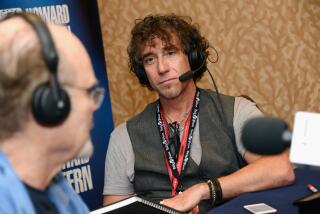Trying to corral Stern’s lost herd
Can millions of listeners just disappear?
That’s a question plaguing Howard Stern and one with vital implications for radio itself in the wake of the shock jock’s heralded and hyped switch from free to satellite broadcasting.
The self-proclaimed King of All Media once commanded a national audience of 12 million daily listeners before jumping to satellite in January. But since then, his kingdom has shrunk to a small fraction of that size. Meanwhile, the shock jock’s main replacements thus far have failed to hold very much of the former flock.
According to industry analysts, the new Stern math scans something like this: At best, he took between 1 million and 2 million listeners with him, and his replacements, spread across many of the country’s major radio markets, are drawing numbers in a similar range.
That leaves 8 million to 10 million nomadic listeners nationwide wandering the terrestrial radio dial in search of a new voice or sound to lead them out of the morning drive-time wilderness. Call them the Howard Stern diaspora, those legions unwilling to fork over satellite subscription fees and unimpressed by pretenders to the throne.
The timing could scarcely be worse for terrestrial radio, which needs an oversized, rudderless audience now like it needs another intriguing and easy-to-use competitor -- say, an iPod, podcasts, personalized CDs or, Stern notwithstanding, the siren songs of satellite.
“It’s unprecedented that a radio personality of Stern’s magnitude has ever just pulled the plug on his show,” said Perry Michael Simon, news-talk-sports editor of AllAccess.com, an online journal of the radio industry. “We’re really in uncharted territory here.”
With limited ratings data so far, it’s hard to tell where the Stern herd is roaming and where big portions of it might ultimately settle, say analysts. But Arbitron ratings clearly demonstrate they aren’t stampeding toward Stern’s big-name replacements, former Van Halen frontman David Lee Roth on the East Coast and comedian Adam Carolla on the West Coast. Although any head-to-head comparisons between the newcomers and the veteran Stern are unfair, say analysts, the pair’s ratings are nevertheless widely regarded as disappointing and, in one case, possibly job threatening.
In their first couple of months, Carolla registered less than a quarter of Stern’s ratings while Roth notched well under a fifth. Executives at CBS Radio have said it will take 18 months to two years to build an audience around their new talent, but even so many contend that Roth might soon be fired.
“I think CBS is already trying to figure out an exit strategy with Roth,” said Michael Harrison, editor and publisher of the talk radio magazine Talker. “The jury is still out on Carolla.”
Meanwhile, Stern’s numbers at Sirius, which has more than 4 million subscribers, remain a mystery. The satellite company, which charges about $13 per month for the service, won’t release audience numbers. But analysts speculate that even if a quarter of the company’s subscribers are daily Stern listeners, that would be considered a staggering success.
In a recent interview, Stern attacked his ex-listeners who are still clinging to terrestrial radio and have refused to cheer him on on the other side.
“You haven’t come with me yet? How dare you?” Stern told Entertainment Weekly. “We’re up to wild, crazy stuff; the show has never sounded better.”
So far, terrestrial radio -- outside of the former Stern affiliates -- have tried the soft sell when courting the enormous uncommitted audience. In most major market cities late last year, counter-marketing largely took the form of billboards touting a particular morning show’s free -- as in, no subscription required -- services. In Los Angeles, “Mancow” Muller, heard on XTRA Sports 570, adopted this strategy. And some rock stations, such as WAAF-FM in Boston, began promoting new online guides for “virgin” listeners to get them up to speed on the show’s colorful characters.
That strategy shows some promise. A Web-based survey by Jacobs Media released last month suggests Stern’s former FM competitors around the country are the ones reaping the benefits.
Although unscientific, the poll, which was based on responses from more than 25,000 listeners from 79 rock stations across the country, showed more than half of Stern’s former audience has not stuck with the affiliate replacements. Instead they seem to be gravitating toward similar, well-established morning programs.
“Stern’s departure has shaken up the pecking order of what people are listening to,” said Fred Jacobs, whose Michigan-based rock radio consulting firm conducted the poll. “It’s a once-in-a-lifetime opportunity for local radio stations.”
In Los Angeles, this is no doubt good news for longtime shows like “Kevin & Bean” on KROQ-FM (106.7) and “Mark & Brian” on KLOS-FM (95.5). Quarterly Arbitron ratings slated to be released this month will probably bear out this trend, say analysts.
“I think what you’re going to find is that existing mature shows that are in the same basic neighborhood of Stern will grow stronger,” said Jacobs. “And the new and fledgling shows are going to perform like new and fledgling shows.”
Other winners in the Stern sweepstakes may be local talk radio -- and oddly enough National Public Radio. More time spent with NPR’s “Morning Edition” may not be as incongruous as it might seem initially for an audience that once tuned into Stern’s carnival of scatological and porn jokes, analysts say.
Morning talk radio tends to be dominated by conservatives, but Stern’s audience tends to be centrist to liberal in political orientation, for which NPR is a better fit, analysts say. And both shows emphasize lifestyle, quirky or offbeat takes on the news and appeal to baby boomers, they say.
“If you love bluegrass, you’re not supposed to love Metallica, but you do,” said Alex DeMers, head of a media consulting firm near Philadelphia. “There’s more than a surface connection between Howard and NPR. As much as Howard is put down as being all about dirt and sex, it’s also intelligent talk, and he’s funny.”
As this audience experiments with other stations, analysts expect ratings to vacillate among the morning shows for months, even years, before the new listening patterns become habit. And even though most believe that the bulk of hard-core fans who couldn’t live without their Stern have already signed up for Sirius, it’s possible more may pony up Sirius subscription fees if terrestrial has nothing to offer them.
“There is nothing else out there right now that approximates Howard,” said Harrison. “Some may eventually migrate to Sirius.”
Then again, added Harrison, in perhaps the darkest scenario for the entire radio universe: “People have lives and they can do other things, including enjoy the silence.”


